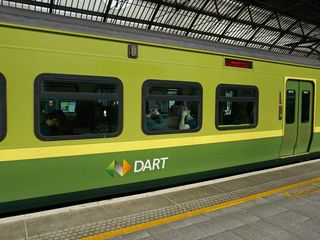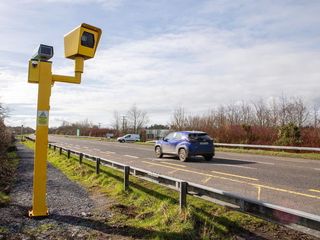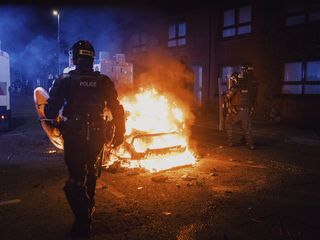Train vandal avoids jail after causing €60k of damage at DART depot
“Looking at him, you’d say butter wouldn’t melt in his mouth but it seems he got up to a lot of mischief and has done a lot of harm to these parties,” the judge said.
DART. Photo: Getty Images
A graffiti artist who looked like "butter wouldn't melt in his mouth" but caused more than €60,000 worth of damage to trains has been spared jail.
Sean Cullen (22) also pepper-sprayed a train driver in the face when he was caught vandalising carriages at a DART depot, one of a series of spray-painting incidents that had “heavy” financial consequences for Irish Rail.
Giving him a four-year suspended sentence, Judge Martin Nolan said Cullen probably thought he was doing no harm but he had got up to “a lot of mischief" that caused "huge inconvenience”.
Cullen, an apprentice electrician of Hope Avenue, East Wall, pleaded guilty at Dublin Circuit Criminal Court to assaulting a train driver and causing criminal damage.
Judge Nolan said it seemed Cullen had “developed a need” to spray paint public buildings and particularly the DART, which had to be cleaned.
There was also an altercation with a train driver while Cullen was with another person who was the “main culprit.”
Today's News in 90 Seconds - July 18th
“Looking at him, you’d say butter wouldn’t melt in his mouth but it seems he got up to a lot of mischief and has done a lot of harm to these parties,” the judge said.
He thought Cullen would “probably not” reoffend and hoped he would contribute to society. He said he had put the accused in custody since a pre-sentence hearing on Wednesday “to warn that that is his future if he misbehaves.”
Cullen was “still very young” and the judge hoped he could change, and that he had learned a lesson from his time in custody.
The accused handed in €2,000 compensation to be given to the driver, or to charity if the victim did not want it.
“You may have thought you were doing no harm, you probably thought it was great fun and you were some sort of artist but this company had to clean these carriages and had to spend a lot of financial resources doing so,” Judge Nolan said.
A sentence hearing earlier this week was told on September 25, 2021, a train driver spotted Cullen and another man spraying carriages at Fairview DART depot and grabbed him. A physical altercation ensued and during the struggle, Cullen pepper-sprayed the driver to the left side of his face before the other man “intervened”.
Read more
The victim (51) suffered a swollen face and was in “quite a lot of pain” when gardai arrived. Cullen had fled and was identified on CCTV footage.
On February 21, 2020, Cullen sprayed the outside of a train at Dublin’s docklands with silver and black spray paint, while the inside was tagged with the letters SD, written by marker.
On June 6, 2020, another tag was sprayed on a signal equipment container at the DART tracks at Merrion Gates in south Dublin.
The court heard carriages had to be taken out of commission and resprayed, with Cullen being held accountable for a damage total of €60,914.
He had one previous conviction for a similar criminal damage offence.
Defence barrister Karl Monahan said it was a “very unfortunate series of offences” with “no real explanation” and serious consequences for Irish Rail.
There was a lot of graffiti around in the area where Cullen grew up, and he “became fascinated by it,” Mr Monahan said.
He also became interested in a movement by street artists in New York in the 1970s spraying trains, and started doing this himself.
“He was shocked when he found out the costs associated with these acts,” Mr Monahan said. “He never imagined it would be anything like that.”
Cullen had written a letter of apology, was “deeply ashamed” of himself, had never intended to cause any harm and did not realise the scale of the damage.
Speaking outside court, Irish Rail's senior security officer Alan Reid said when carriages are vandalised it takes them out of service for a week on average.
"Graffiti causes significant damage to the railway," he said. "It’s done at nighttime and has a real impact on drivers and the public in general, because it takes trains out of service for lengthy periods of time. The cost per carriage is about 25k because they often have to go back to metal to restore the paintwork."








































